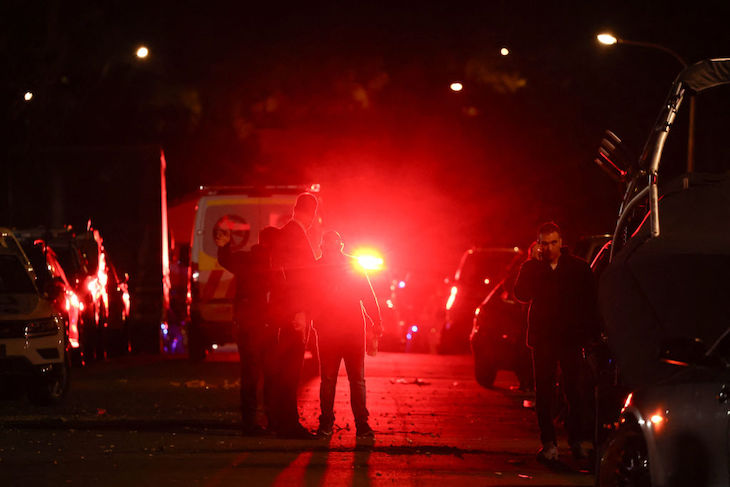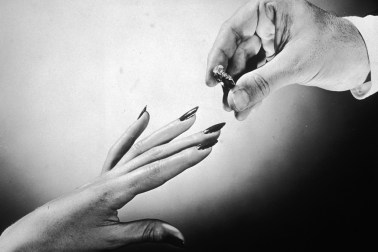In her new book, Liz Truss says she likes Australia and Australians. The country is, she says, ‘like Britain without the hand-wringing and declinism’. But had Truss cared to scratch beneath the surface on her visits Down Under, she might have realised that Australians today are anything but the laid-back, easygoing, and ‘she’ll be right’ society of our national mythology.
Following the Hamas atrocities of 7 October, things have only got worse
Far from it. Australians are struggling to keep a lid on social, political, ethnic and religious tensions reflected in their society. Far from being a united nation, Australia is increasingly a nation of tribes, each sticking with their own, each finding enemies in those different to them, and each unwilling, even refusing, to find common ground with other Australians.
Since the covid years, when Australian governments imposed some of the most authoritarian restrictions in the Western world and were more than willing to play Australians off against each other – denouncing those who didn’t accept their hardline restrictions on personal liberties – Australian society has become more fragmented, intolerant and angry.
Following the Hamas atrocities of 7 October, things have only got worse. Thousands of pro-Palestinian protestors have regularly taken to the streets of our cities, with some chanting vile slogans including ‘f*** the Jews’. The first such demonstration, near the Sydney Opera House on 9 October was, shamefully, almost certainly the first vicious anti-Semitic demonstration in a major Western city after the Hamas attacks. In Melbourne in December, a visiting delegation of relatives of Israelis killed or abducted by Hamas were forced to seek shelter in a police station during a demonstration.
Many Australians are dismayed at seeing what has unfolded on the country’s streets and are fearful what is happening to their seemingly tolerant country. An attack on an Assyrian church in inner-suburban Sydney this week has heightened these fears. A mentally-troubled youth has been arrested in connection with what is being treated as a terror attack, in which a bishop celebrating Mass and several congregants were knifed at the altar. The attacker’s motives remain unclear, although the New South Wales police commissioner has said the boy’s cries in the church ‘centred around religion’. Whatever the motivation, the visceral community response to the incident gives a sense of the anger many feel. A crowd of up to 600 people converged on the church with some demanding that police hand over the suspect. Hours of rioting led to dozens of police officers and paramedics being injured.
In recent years, Australia’s ethnic and religious makeup has changed dramatically. There is no doubt that this has mostly been a good thing; multiculturalism’s contribution to national life is positive and millions of immigrants – and their children – have enjoyed opportunities Down Under that they never had in their home countries. Indeed, the selfless bravery of people from France and Pakistan in confronting the killer in the Bondi Junction shopping mall rampage last week united the country. Australia’s now diverse population has made a once monochrome nation a truly colourful, diverse and vibrant society that outsiders like Liz Truss rightly celebrate. But an ugly underbelly of ethic and religious divisions and hatred, that should have been left behind by those who cling to them, pose intractable social and political problems for Australian society as a whole.
Intolerance has spread through not just Australian society, but public discourse. Last year’s ugly and deeply divisive debate about a constitutionally-mandated Aboriginal ‘voice’ to parliament and government split the nation on political and racial lines that will take years to heal, if indeed they ever will. The so-called gender and culture wars are being fought, if anything, even more aggressively and spitefully in Australia than they are even in Britain. And the brutally polemic tone of debate, in Australia’s parliament let alone social media, has turned increasingly darker and nastier as civil society notions of agreeing to disagree, and respecting people holding different points of view, are swept aside.
In terms of managing and defusing these deep social tensions and divisions, however, Australia’s political leadership is proving inadequate, in no small part due to electoral arithmetic. The domestic politics of the war in Gaza highlight the problem. The lower house of Australia’s national parliament has 151 seats. Currently, the governing Labor party holds 78 seats and a three-seat overall majority. Many immigrants have settled in working-class suburbs of Sydney and Melbourne which means their vote is concentrated in mostly Labor-held constituencies.
Currently, opinion polls indicate Labor’s slim majority is under threat at the general election due by May next year, not just to the conservative Opposition but to the hard-left Greens party and independent opponents who are stridently pro-Palestinian and anti-Israel. Of the 27 Labor-held seats where Muslims constitute more than five per cent of the population, nine have a Muslim population proportionally greater than the margin by which Labor currently holds the seat. Only one Labor seat, in Melbourne, has a similarly significant Jewish population: that seat is under serious threat from the hard-left Greens party which uses parliament as a platform for anti-Israel and anti-Zionist rhetoric.
These are problems caused by a radical few
Understandably, Labor MPs in those constituencies – including cabinet ministers – struggle to always defend Israel’s right to protect itself or to unequivocally condemn Hamas. Labor party and activist pressure is urging the government of prime minister Anthony Albanese to do likewise. Indeed, since the initial reaction to 7 October – when the Australian foreign minister, Penny Wong, urged Israel to show ‘restraint’ in responding to the horrendous Hamas massacres – Australia’s official position, as demonstrated in successive United Nations resolution votes, has shifted from outright support for Israel, to abstention, to now joining motions calling for a Gaza ceasefire.
Such polarisation, post-7 October, is not unique to Australia, but solidarity with Gaza and antagonism to Israel in some of Australia’s diverse communities is unusually crucial to domestic and electoral politics. Albanese’s government depends for its survival on holding seats deemed winnable by the radical Greens with sizeable minority populations. This has meant, in some cases, watering down support for Israel and Jewish Australians. The government has also been reluctant at times to use anti-discrimination powers to confront and prosecute Islamist hate preachers who remain free to poison the minds of the vulnerable.
Similarly, when last year the campaign for the Aboriginal voice to parliament split the nation, the prime minister and senior ministers were noticeably quiet when it came to restraining firebrand allies on the Yes side who denounced anyone voting No as ignorant, redneck and – shamefully – racist.
These are problems caused by a radical few, not the overwhelming majority, but all Australians live with the consequences. As a result, Australian society is less open, less free, less trusting, and more fearful than it was just a few short years ago.
Former Australian prime minister John Howard was fond of saying that what unites Australians is greater than what divides them. In that spirit, Australians of all faiths and nationalities should look to the example of Assyrian bishop Mar-Mari Emmanuel, the target of this week’s church stabbing incident. ‘I forgive whoever has done this act and I say to him, you are my son, I love you and will always pray for you’, the bishop said in an audio message shared by his church. He added: ‘And whoever sent you to do this, I forgive them as well.’






Comments